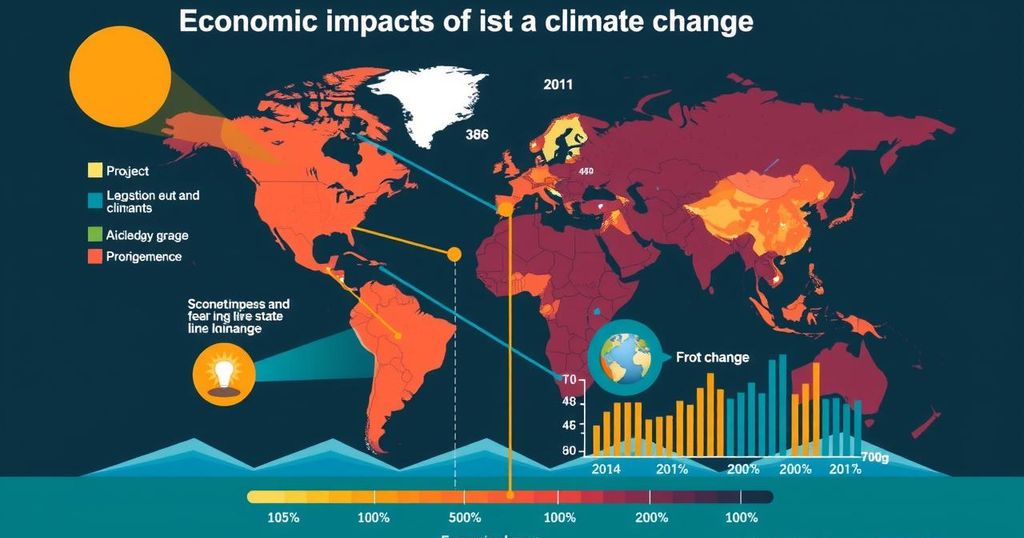The escalating climate crisis is intricately linked to rising global inflation, which has led to soaring prices for essential goods. The effects of extreme weather on agriculture are exacerbating costs, particularly impacting vulnerable populations in Africa and Latin America. Policymakers need to integrate climate considerations into economic policies to mitigate these interconnected challenges and promote resilience against current and future shocks.
The climate crisis represents a multifaceted threat, exacerbated by global inflation, which has surged, elevating the costs of essential goods including food and energy. This pressing issue dominates discussions, particularly in G20 nations. For instance, 41% of Americans identified inflation as their foremost concern ahead of this year’s presidential elections. However, the nexus between inflation and climate change remains largely underdiscussed.
Extreme weather events—intensified by climate change—disrupt agricultural production, spoil harvests, and escalate food prices. As these events, including floods, heatwaves, and droughts, become more frequent, their cumulative impacts are increasingly evident across economies, particularly in Africa and Latin America, where food expenditures constitute a significant portion of household budgets. A case in point is the ongoing hunger crisis resulting from drought in Malawi, Mozambique, Zambia, and Zimbabwe, linked to the influences of El Niño.
Amidst rising costs, the economic repercussions of climate change on vulnerable populations often go unnoticed, overshadowed by discussions centered around green growth. Yet, extreme weather events are already inflating food prices, as evidenced in Brazil, West Africa, and Vietnam. A study from the Potsdam Institute for Climate Impact Research and the European Central Bank foretells that rising temperatures could increase annual food inflation by 3.2 percentage points and overall inflation by 1.18 percentage points by 2035.
The issue mandates that policymakers no longer regard climate change as purely an environmental challenge; it must integrate with economic policy. Financial authorities should recognize climate-related risks in inflation assessments and policies, similar to how they currently address risks associated with transitioning to a low-carbon economy. Initiatives from the Central Bank of Costa Rica and the South African Reserve Bank highlight early adaptiveness toward recognizing climate impacts.
Collaboration between central banks and climate organizations fosters innovative economic strategies against the interrelated shocks from climate effects and inflation. For instance, the African Climate Foundation has developed platforms that utilize advanced analytics for investment and policy prioritization, effectively building resilience against climate shocks.
Following Cyclone Freddy’s devastation in Malawi, such financial tools have proven invaluable in crafting sustainable economic responses. Concurrently, other climate think tanks advocate for the integration of climate risks in economic frameworks: Iniciativa Climática de México promotes climate considerations in policy design, while Brazilian initiatives urge the establishment of protective measures for low-income communities.
Regional cooperation remains vital, especially in climate-vulnerable nations. Collaborative platforms can facilitate tailored economic policies that address local vulnerabilities, such as the Inter-American Development Bank’s initiative. On a global scale, the synergy between economic and climate institutions is vital; mechanisms like the EU’s Carbon Border Adjustment highlight the need for equitable policy designs.
Countries like Brazil and South Africa, with their forthcoming global summits, hold strategic positions to elevate the discourse surrounding inflation and climate policies. A failure to unite in response can exacerbate inequality and undermine both economic stability and climate objectives. Thus, embracing integrated and equitable approaches has never been more essential as the dual challenges of rising inflation and climate risks emerge.
The interrelation between the climate crisis and economic inflation has garnered increasing attention in recent years, particularly as global inflation rates have surged, leading to rising costs of living for many households. Extreme weather events driven by climate change are intensifying, resulting in adverse outcomes on agricultural production, threatening food security, and raising essential commodity prices. As policymakers navigate these dual challenges, a comprehensive understanding of the economic implications of climate disruptions is crucial for formulating effective responses. The economic toll of climate change, especially on vulnerable populations in the Global South, underscores the urgency for integrated climate and economic strategies.
In conclusion, the intersection of climate change and global inflation presents an urgent challenge that demands actionable strategies. Policymakers must embrace the necessity of integrating climate considerations into economic frameworks to mitigate the adverse economic impacts while fostering long-term resilience. As climate-related disruptions become more pronounced, coordinated efforts at regional and global levels to tackle these challenges will be vital in ensuring economic stability and social equity moving forward.
Original Source: www.bangkokpost.com






